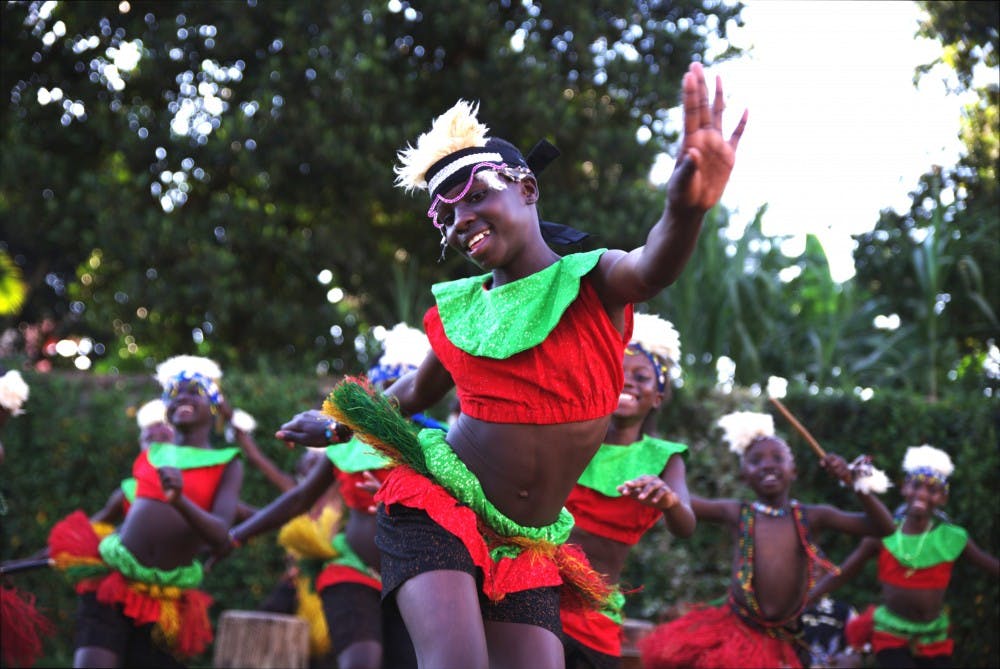From a Ugandan orphanage to the Monroe County Public Library, Ugandan children will present Dance of Hope at 7 p.m. March 29 in the Monroe County Public Library. The free event is sponsored by the Bloomington-based Lotus Blossoms Educational Outreach Program.
Dance of Hope is a touring program made possible through the program's collaboration with the M-Lisada orphanage in Kampala, Uganda.
The performers are children ranging from age 9 to 17, many of whom live in M-Lisada, said Herbet Kinobe, DOH co-founder and internationally recognized musician.
“The mission of DOH is to build communities and inspire young people to become independent global citizens,” Kinobe said.
The children will tell the stories of Africa through original dances to the music of instruments such as the talking drum, a drum that can adjust pitch so much it is said to be talking, and the kora, a 21-string harp lute from West Africa.
The group members will also share their own narratives on how music has become a means of survival, transformed their lives and given them hope, Kinobe said.
The children have been working on this performance for six years Kinobe said.
Some of members of DOH were 6 or 7 years old when they joined the group. This is their first tour and their first time leaving Uganda, Kinobe said.
“DOH is different from any other kind of cultural entertainment group,” Kinobe said. “The kids are amazing dancers, entertainers and singers, but that is not the only thing we represent.”
The children in DOH will be leading educational outreach programs about Ugandan music and culture at schools and universities all over the United States, Kinobe said. DOH empowers children, who have come from a place of no hope and low self-esteem, to become teachers. This gives the children a great sense of pride in themselves and their culture.
Before Bloomington, DOH performed and taught in New Jersey, Texas, Arizona, California Washington, Minnesota and Michigan. The tour will end in mid-May with performances in Virginia, North Carolina and South Carolina.
“The theme of the tour is to build bridges and to build self-esteem,” Kinobe said. “We are going to 40 schools in the U.S. on this tour and performing for 15,000 children in total.”
Another way DOH is building bridges is by having the children from DOH spend time with American host families while on tour.
Here in Bloomington, the children from DOH will be staying with three host families, said Loraine Martin, outreach director of the Lotus Education and Arts Foundation.
“This is a way for this group to have an experience learning what it is to be part of a family here in the U.S. and learn about what kids their age do for fun, what kind of meals and food we have," Martin said.
In addition to performing and providing educational outreach programs, the members of DOH are raising funds for building a new children’s center to provide more homes for children living on the streets in Kampala, Uganda.
Kinobe said Dance of Hope emerged in 2012 after a conversation between Kinobe and Bosco Segawa, the founder of the M-Lisada orphanage.
M-Lisada stands for music, life skills and destitution alleviation. Almost all children at M-Lisada participate in performing programs such as brass band, jazz band and cultural dance, according to their website.
“The idea was to get the children from a local level to an international level," Kinobe said. “We have been working towards the dream of giving them a global platform, which is happening on this tour.”
One other founder, Dima Itskovich, joins Kinobe and Segawa in making DOH possible. Itskovich focuses on business relations and connecting DOH to global organizations. Kinobe organizes the international travel of DOH, and Segawa works on helping the children of DOH and M-Lisada in their everyday lives, Kinobe said.
“DOH is an organization that uses the arts to help elevate the lives of orphaned children and children experiencing poverty in Uganda,” Martin said. “We could not be happier about hosting this group.”
The founders want to provide a path for children who have lived through the worst imaginable circumstances to something that can bring them hope, Kinobe said.
"The music has changed them," Kinobe said. "The music has given them education. The music has given them a home. The music has given them a family."




